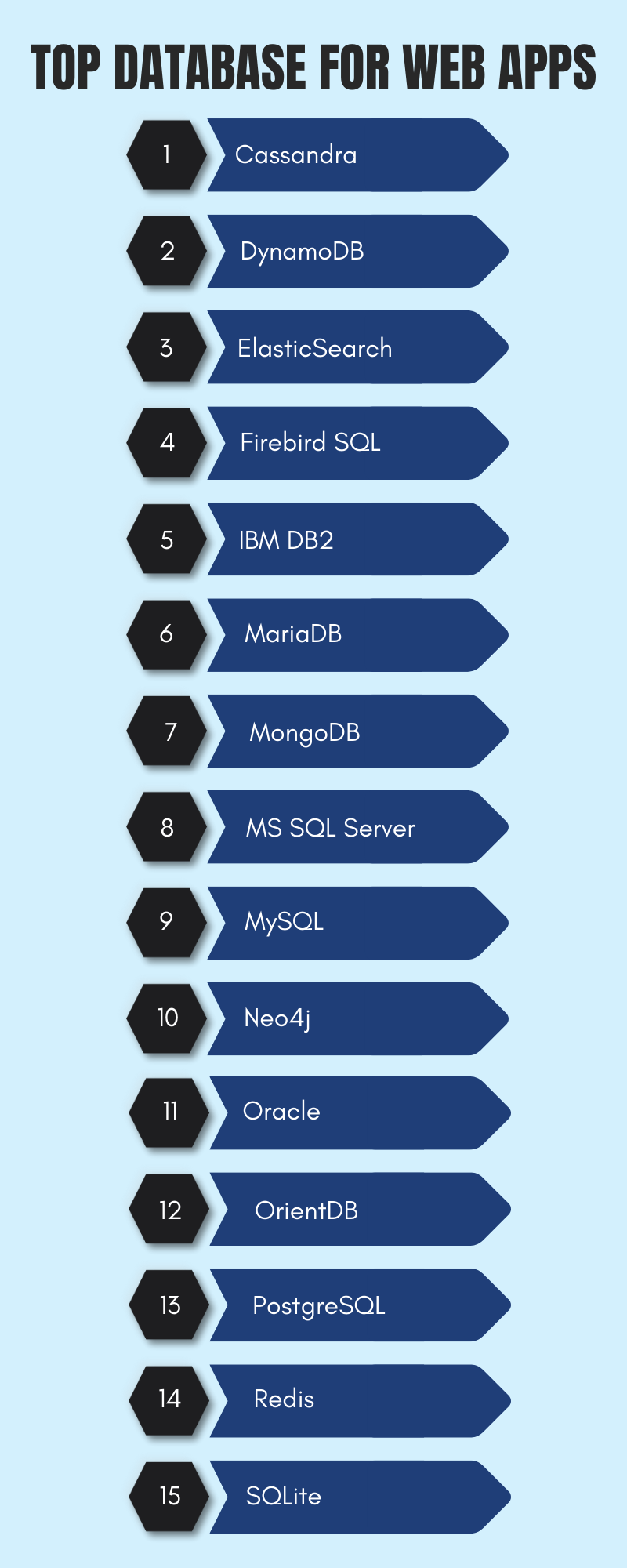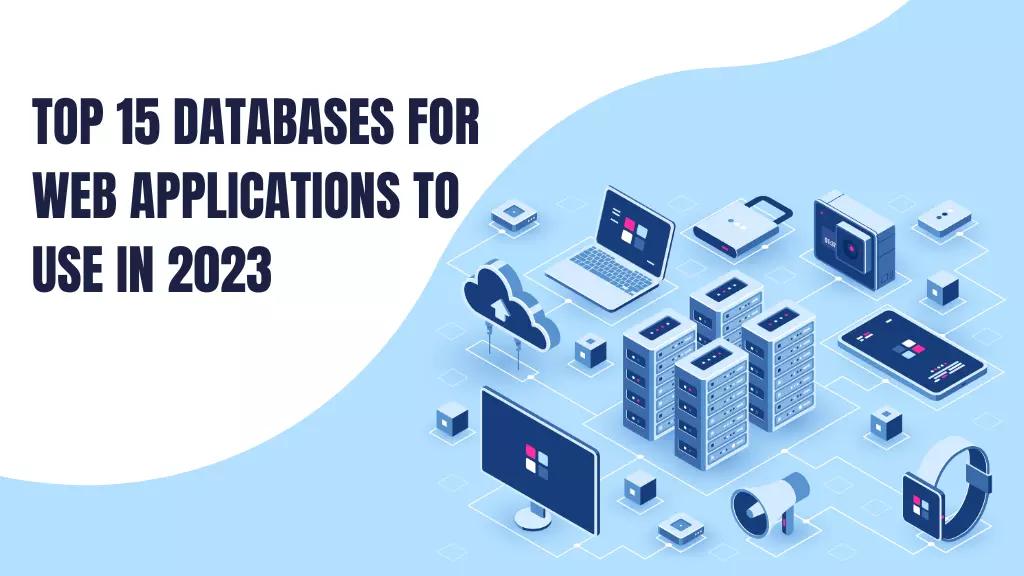15 Top Database for Web Applications to Use in 2023. The database is an integral part of any software or application. No matter what kind of software you are developing, it is important that you use the right database according to your business and project needs.
With new trends, technologies, and techniques coming up every bit, there are plenty of databases available, which you can consider using for developing web applications.
Read: Database Schema
But before briefing you about the list of the best database for web application development, let us first fill you up on what a database is.
What is a Database?
Database is the collection of structured and organized data which is usually managed by a database management system. It stores different types of data like inventory, customer details, blog posts, and several others.
Top 15 Database for Web Applications to Consider in 2023
Here is the list of top 15 databases for web apps to use in 2023 are as follows -
-
Cassandra
-
DynamoDB
-
ElasticSearch
-
Firebird SQL
-
IBM DB2
-
MariaDB
-
MongoDB
-
MS SQL Server
-
MySQL
-
Neo4j
-
Oracle
-
OrientDB
-
PostgreSQL
-
Redis
-
SQLite
1. Cassandra
It is a highly scalable open-source NoSQL distributed database that is used by industry giants like Uber, Netflix, Reddit, and many others.
It is a high-performing database along with capabilities like fault tolerance, and replication across multiple data centers, and also has low maintenance costs.
In addition, it also helps in handling massive volumes of data and is scheme-free, which helps in creating columns within the rows.
2. DynamoDB
It is a fast NoSQL Database written in Java and offers high performance and scalability. It is also known as Amazon DynamoDB and can be easily integrated with other tools that come with AWS like Lambda and CloudFront.
It also offers security, in-memory caching, and constant latency alongside supporting document data structures and key-value. Zoom, Samsung, and Dropbox are the famous companies that use this database in their applications.
Read: MongoDB vs DynamoDB
3. ElasticSearch
It is an open-source, free, and distributed database for web app development that is used by companies like GitHub and Wikipedia. It helps in developing fast, high-performing, and scalable web apps and is easy to use.
It is developed on top of the Apache Lucene search library and is easy to integrate with different programming languages. Its other features include that it is schema-less, document-oriented, and also facilitates different data handling functions.
4. Firebird SQL
It is a free relational database management system that supports various operating systems like Windows, Linux, macOS, and several other platforms.
Its features include flexibility in managing transactions, is compatible with NASI SQL, stored procedures, foreign keys, and many others.
5. IBM DB2
Formerly known as DB2, it helps in handling a massive amount of data along with supporting data science languages like Python. It is compatible with different operating systems like Windows, UNIX, and Linux.
It also helps multiple data types and is used by well-known companies like Audi AG, and Penske. In addition, it supports different languages like French, German, Japanese, and many languages along with English.
6. MariaDB
It is a relational database management system that helps in developing web application. It can easily replace the web server MySQL without changing the code. It offers a wide range of features like security, scalability, compatibility, and better performance.
Accenture and Grooveshark are some well-known companies that use this database in their applications.

7. MongoDB
It is a cross-platform and document-oriented database developed by MongoDB Inc. It is a NoSQL database program that supports a wide range of programming languages like C, C#, Python, Ruby on Rails, Rust, and many more and is written in C++, Javascript, and Python.
The features include that it is schema-less, is easy to use, and helps in the development of large-scale web applications.
8. MS SQL Server
It is used by famous industry leaders like Microsoft, Hepsiburada, and many others. It is a relational database management system that is powerful and highly preferred by businesses.
It provides an extensive range of features and functionalities like the capability to handle large-scale data and high-traffic loads, security features to prevent unauthorized access, ease to use, and also consumes less time for laborious chores.
9. MySQL
It is an open-source database written in C and C++. It is highly preferred by the developers for providing the most dependable SQL server integration services. Meta formerly known as Facebook is one of the famous corporate giants that use this database in their applications.
Besides this, its features include that it supports data recovery, replicates automatically, has intuitive graphical interface support, and many other features, making it the most used database for developing high-end web applications.
10. Neo4j
It is another database management system that helps you in saving data in the form of graphs rather than tables. It is an ACID-compliant transactional database that is highly effective for web development.
Its primary features include that it provides better performance for a small dataset along with API support, is compatible with UNIQUE constraints, and also facilitates an elegant property graph model to store data.
11. Oracle
It is the most famous database system that is preferred by enterprise-level and large-scale businesses. It is widely used for scalability and high performance and is built with C, C++, and Java.
Its other features include that it supports SQL and JSON, enables PDF and key-value storage, allows backup and restoration, and also supports a variety of platforms.
12. OrientDB
It is an open-source NoSQL multi-model database management that supports multiple models like a graph, document, key/value, and several other models. It is easy to use, has a user-friendly interface, has a flexible schema, and can be easily scaled.
Its other features include compatibility with graphs and documents, support for multiple databases, and also allows the addition of multiple users to work simultaneously.
13. PostgreSQL
It is an open-source object-relational database management system that supports multiple data types. It has a wide community of support from users and developers worldwide and helps in developing critical applications.
Its other features include that it can be easily integrated with multiple servers, provides data security, ensures high-quality data integrity, has a user-friendly interface, and also provides rapid response.
14. Redis
Also known as Remote Dictionary Server, it is one of the most loved database platforms. It is an open-source database that facilitates high performance and is capable of handling a large amount of data and traffic.
Its other features include that it offers flexibility, scalability, lua scripting, is easily adaptable, and is easy to adopt and use. In addition, it also facilitates a personal hashing mechanism and also provides automatic data partitioning.
15. SQLite
It is one of the best open-source relational databases that is highly preferred for developing web applications. It is lightweight, easy to use, and helps in developing small and medium-sized web apps.
It is compatible with different operating systems like Windows, Linux, Mac, and Solaris. Its other features include that it supports zero configurations, has no external dependencies, and also helps in transferring data easily.
Wrapping It Up
Now that you have learned about some of the best databases that you can consider using for web app development. But while developing an application make sure that you choose the right database according to your project requirements.
So, if you are thinking about developing a web app for your business, then connect with us and we will help you choose the best database according to your project needs and develop the best application for your business.
FAQs About Database
What are the different types of databases?
-
There are three main types of databases, and they are as follows -
-
Relational Database
-
NoSQL Database, and
-
In-memory Database.
-
What are the main functions of a database?
-
The key function of a database is to collect and organize data in a structured form alongside helping with data security and integrity, data recovery, storage, backup, and several other features.
What are the components of a database?
-
The primary components of a database are hardware, software, data, procedure, and database access language.
What are the advantages of a Database?
-
The benefits of a database are -
-
It reduces data redundancy.
-
Improves the data security
-
It reduces the data-related costs for storage and retrieval, and
-
It also helps with increased consistency.
-

